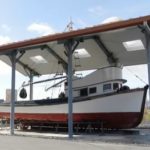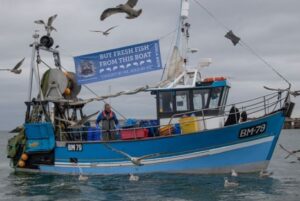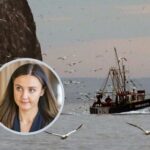Daily Archives: August 27, 2016
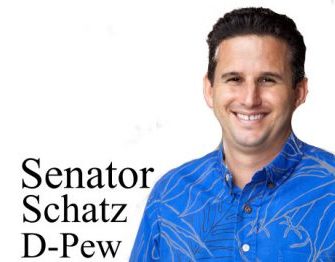
Hawaii Commercial Fishermen, Seafood Consumers Hit Again as President, Pew’s Ocean Legacy Closes Additional 442,778 Square Miles of Fishing Grounds in the U.S. Pacific Islands
“We do not believe the expansion is based on the best available scientific information,” said Kitty Simonds, Council executive director. “It serves a political legacy rather than any conservation benefits to pelagic species such as tunas, billfish, sea turtles, seabirds and marine mammals. The campaign to expand the monument was organized by a multibillion dollar, agenda-driven environmental organization that has preyed upon the public’s lack of understanding of ocean resource management issues and utilized influential native Hawaiians and several high-level politicians to lead this initiative. Our government has chosen to follow the Pew’s Ocean Legacy.” Read the press release here 21:34
Brookings gets innovative seafood processing plant
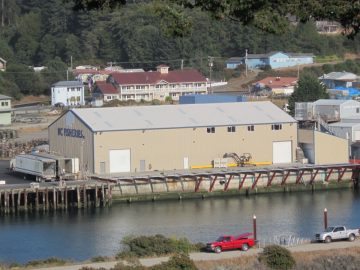 BC Fisheries owner Mike Manning cut the ribbon Aug. 19 on a $9.6 million seafood processing facility that will benefit southern Oregon coast crabbers and shrimpers. The facility will create 30 new jobs, eliminate the need for long-distance shipping of locally-caught seafood for processing, and is the first of its kind to use cool steam technology on the West Coast. Established in 2007, BC Fisheries is a family-owned company that ships cold-water pink shrimp and crab worldwide, offloading about 1.5 million pounds per month. It was unable to process shrimp locally though, leading to high transportation costs. A $6.3 million loan from Craft3, a nonprofit that makes loans for business development, allowed BC Fisheries to build an insulated processing building next to the docks at the Port of Brookings Harbor, purchase equipment, and have adequate working capital. The new facility will be able to process up to 2.4 million pounds of shrimp per month. Read the story here 20:37
BC Fisheries owner Mike Manning cut the ribbon Aug. 19 on a $9.6 million seafood processing facility that will benefit southern Oregon coast crabbers and shrimpers. The facility will create 30 new jobs, eliminate the need for long-distance shipping of locally-caught seafood for processing, and is the first of its kind to use cool steam technology on the West Coast. Established in 2007, BC Fisheries is a family-owned company that ships cold-water pink shrimp and crab worldwide, offloading about 1.5 million pounds per month. It was unable to process shrimp locally though, leading to high transportation costs. A $6.3 million loan from Craft3, a nonprofit that makes loans for business development, allowed BC Fisheries to build an insulated processing building next to the docks at the Port of Brookings Harbor, purchase equipment, and have adequate working capital. The new facility will be able to process up to 2.4 million pounds of shrimp per month. Read the story here 20:37
Marine Monument excerpts from Press Briefing by Press Secretary Josh Earnest, 8/26/2016
 11:52 A.M. EDT MR. EARNEST: Morning, everybody. Happy Friday. Before we get started I’ll just do a — one piece of news you may have seen already. As part of the President’s commitment to protect the natural beauty of the United States, we announced today that President Obama is building on this leadership by taking an historic step in creating the world’s largest marine protected area just off the coast of Hawaii. The designation will more than quadruple the size of the existing marine monument, permanently protecting pristine coral reefs, deep-sea marine habitats, and other important ecological features and resources in the waters of the northwest Hawaiian Islands.,, a lot of scientists have talked about the importance of protecting areas closer to the continental United States — in New England, in the Southeast, in the Gulf. These are proposals,,, Read the rest here 19:03
11:52 A.M. EDT MR. EARNEST: Morning, everybody. Happy Friday. Before we get started I’ll just do a — one piece of news you may have seen already. As part of the President’s commitment to protect the natural beauty of the United States, we announced today that President Obama is building on this leadership by taking an historic step in creating the world’s largest marine protected area just off the coast of Hawaii. The designation will more than quadruple the size of the existing marine monument, permanently protecting pristine coral reefs, deep-sea marine habitats, and other important ecological features and resources in the waters of the northwest Hawaiian Islands.,, a lot of scientists have talked about the importance of protecting areas closer to the continental United States — in New England, in the Southeast, in the Gulf. These are proposals,,, Read the rest here 19:03
Rep. Louise Stutes, R-Kodiak calls for Pink Salmon Fishery Disaster Declaration
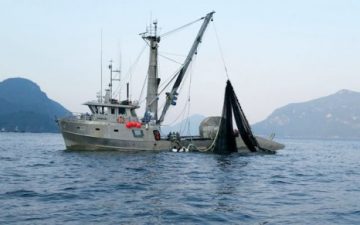 Two measures of relief for Alaska’s pink salmon industry, reeling from the lowest harvest since the late 1970s, are being sought. Rep. Louise Stutes, R-Kodiak, last week asked the Walker administration to declare the pink salmon season a disaster, which would open up access to federal relief funds. Pinks are Alaska’s highest volume salmon fishery, though the price tends to be the lowest. Hundreds of fishermen depend on pinks to boost their overall catches and paychecks. So far, the statewide harvest is just 36 million humpies, far less than a preseason forecast of 90 million. Last summer, 190 million pinks were caught. For pinks, every other year is typically a strong year, with a weak year in between. “This is the worst salmon year in nearly 40 years, and that’s huge,” she said. “It doesn’t just affect the fishermen — it’s a trickle-down effect on the cannery workers, the processors and nearly all businesses in the community. It’s a disaster, there’s no other way to describe it.” Read the rest here 17:17
Two measures of relief for Alaska’s pink salmon industry, reeling from the lowest harvest since the late 1970s, are being sought. Rep. Louise Stutes, R-Kodiak, last week asked the Walker administration to declare the pink salmon season a disaster, which would open up access to federal relief funds. Pinks are Alaska’s highest volume salmon fishery, though the price tends to be the lowest. Hundreds of fishermen depend on pinks to boost their overall catches and paychecks. So far, the statewide harvest is just 36 million humpies, far less than a preseason forecast of 90 million. Last summer, 190 million pinks were caught. For pinks, every other year is typically a strong year, with a weak year in between. “This is the worst salmon year in nearly 40 years, and that’s huge,” she said. “It doesn’t just affect the fishermen — it’s a trickle-down effect on the cannery workers, the processors and nearly all businesses in the community. It’s a disaster, there’s no other way to describe it.” Read the rest here 17:17
J.J. The Lobster – The heaviest lobster to be found in UK waters in 85 years
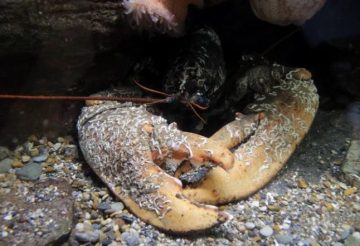 The heaviest UK-landed common lobster is settling into his new home. Weighing in at nearly 17lb (7.65kg), he is the heaviest common lobster to be discovered in UK waters since 1931. The lobster, which was initially called Lionel, was discovered earlier this month in waters off Lannacombe Beach , north Devon, by free diver Joe Pike. It was taken to the National Marine Aquarium in Plymouth to be weighed and checked over by vets. The lobster has now joined the Aquarium’s Plymouth Sound tank with a brand new name, JJ – in honour of British Olympic silver medal-winning boxer Joe Joyce, a super heavyweight. Aquarium curator James Wright said: “After weighing JJ in at 7.65kg, it does indeed look like he is the heaviest common lobster to be discovered in UK waters since 1931. Read the rest here 12:25
The heaviest UK-landed common lobster is settling into his new home. Weighing in at nearly 17lb (7.65kg), he is the heaviest common lobster to be discovered in UK waters since 1931. The lobster, which was initially called Lionel, was discovered earlier this month in waters off Lannacombe Beach , north Devon, by free diver Joe Pike. It was taken to the National Marine Aquarium in Plymouth to be weighed and checked over by vets. The lobster has now joined the Aquarium’s Plymouth Sound tank with a brand new name, JJ – in honour of British Olympic silver medal-winning boxer Joe Joyce, a super heavyweight. Aquarium curator James Wright said: “After weighing JJ in at 7.65kg, it does indeed look like he is the heaviest common lobster to be discovered in UK waters since 1931. Read the rest here 12:25
It’s time for P.E.I. Fishermen’s Association to grow up
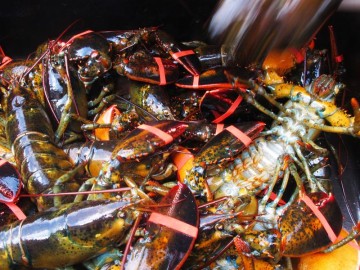 ‘Will fishermen assume their traditional role of bitching and complaining, and doing little else?’ General speaking, lobster fishermen fishing the spring season on the Island had a “pretty good year.” While catches were down from last year in some harbours on the north side and on the south-east coast, prices ranging from $6.50 to $8 a pound made up for it. There wouldn’t be many boats that grossed less than $100,000 and there’d be a good many that grossed well over $200,000.,, Recently the Department of Fisheries and Oceans (DFO) decided to gradually increase the minimum legal size for lobsters caught in District 25. Scientific and anecdotal evidence suggests that following an increase in the carapace size, catch sizes also increase. There seems to be general acceptance of this change. However, no one was surprised when PEIFA opposed the measure. Read the story here 12:00
‘Will fishermen assume their traditional role of bitching and complaining, and doing little else?’ General speaking, lobster fishermen fishing the spring season on the Island had a “pretty good year.” While catches were down from last year in some harbours on the north side and on the south-east coast, prices ranging from $6.50 to $8 a pound made up for it. There wouldn’t be many boats that grossed less than $100,000 and there’d be a good many that grossed well over $200,000.,, Recently the Department of Fisheries and Oceans (DFO) decided to gradually increase the minimum legal size for lobsters caught in District 25. Scientific and anecdotal evidence suggests that following an increase in the carapace size, catch sizes also increase. There seems to be general acceptance of this change. However, no one was surprised when PEIFA opposed the measure. Read the story here 12:00
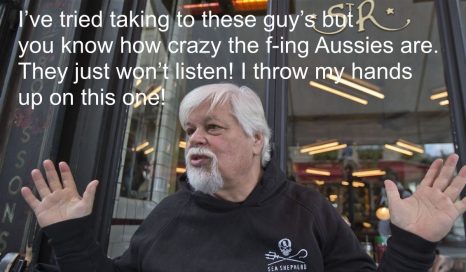
That Sea Shepherd Promise To Stop Harassing Whalers? Don’t bet on it!
A United States court ruling preventing the environmental activist group Sea Shepherd from harassing Japanese whaling boats will not stop the annual protection campaign in the Southern Ocean, according to the organization’s sea lawyers. Sea Shepherd Australia’s boss, Jeff Hansen, told reporters they are “committed to upholding the Australian federal court ruling banning the slaughter of whales in the Australian whale sanctuary. We are not concerned about the US court settlement as it does not have any effect on Australian law.” “What it means is Sea Shepherd USA cannot give money toward the Southern Ocean campaign, cannot be involved in the Southern Ocean campaign, and that’s fine.” said Sea Shepherd founder Paul Watson who claims the settlement does not affect the group’s other entities. “Whether Sea Shepherd Australia or Sea Shepherd Global . . . intend to return to the Southern Ocean that’s their business and I can’t control them,” he said of the settlement filed on Tuesday. Read the story here 09:52
Battle over Cashes Ledge and Seamounts continues between fishermen, environmentalists
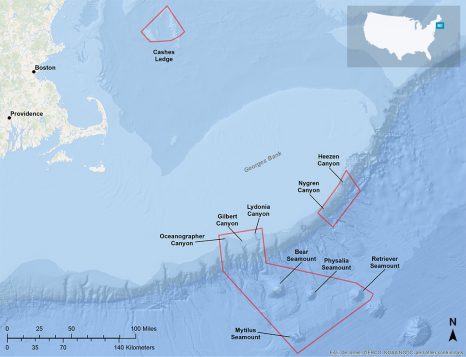 Despite the Obama administration’s declaration that Cashes Ledge has been taken off the table as a possible location for a marine national monument, the divisive issue of the monuments continues to percolate nationally between fishermen and conservationists. From Hawaii to New England, the lines are clearly drawn. Conservation groups have sustained a steady lobbying campaign to convince President Obama to employ the Antiquities Act to create new marine national monuments in the waters around Cashes Ledge, about 80 miles off Gloucester, and the seamounts off southern New England and Monterey, California. “We’re pushing as hard as we can with elected officials and the White House on those areas that have been identified and confirmed by the scientific community as being of great interest,” Peter Shelley, interim president and senior counsel at the Conservation Law Foundation, said of two New England areas. “These areas need permanent protection and this is not going to go away as a priority for us.” “This is not going to go away as a priority for us,” Shelley said. “It is not going to change with (presidential) administrations.” Read the story here 08:17
Despite the Obama administration’s declaration that Cashes Ledge has been taken off the table as a possible location for a marine national monument, the divisive issue of the monuments continues to percolate nationally between fishermen and conservationists. From Hawaii to New England, the lines are clearly drawn. Conservation groups have sustained a steady lobbying campaign to convince President Obama to employ the Antiquities Act to create new marine national monuments in the waters around Cashes Ledge, about 80 miles off Gloucester, and the seamounts off southern New England and Monterey, California. “We’re pushing as hard as we can with elected officials and the White House on those areas that have been identified and confirmed by the scientific community as being of great interest,” Peter Shelley, interim president and senior counsel at the Conservation Law Foundation, said of two New England areas. “These areas need permanent protection and this is not going to go away as a priority for us.” “This is not going to go away as a priority for us,” Shelley said. “It is not going to change with (presidential) administrations.” Read the story here 08:17






































